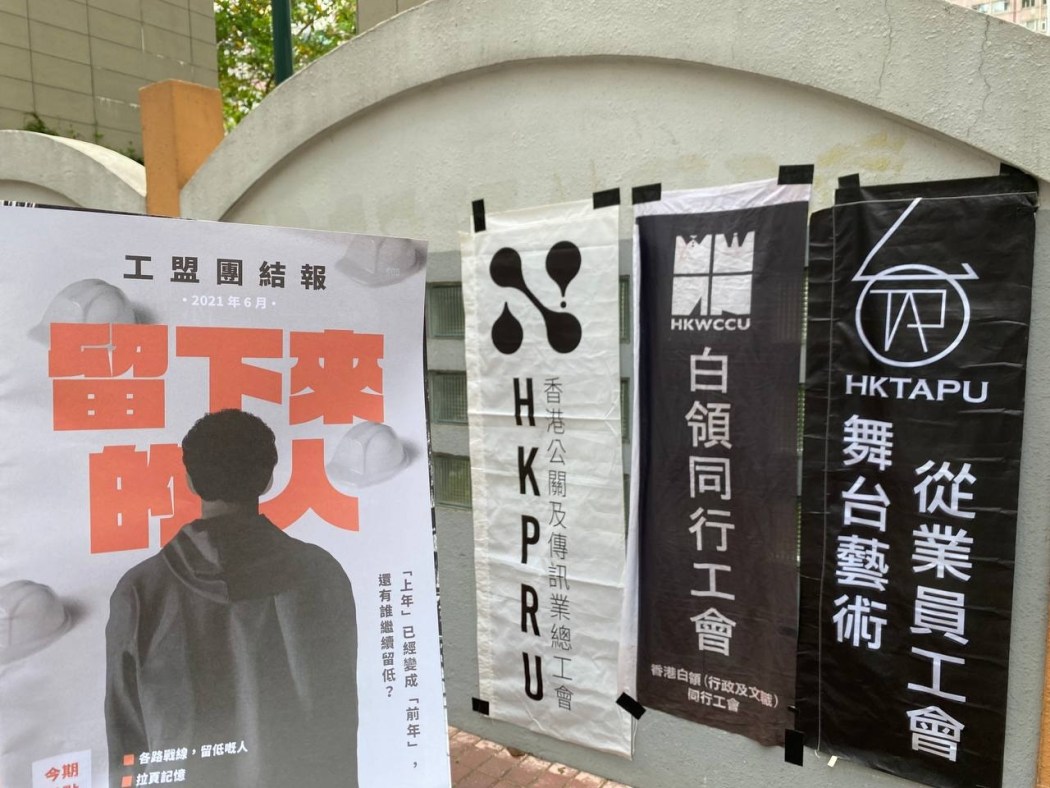A Hong Kong pro-democracy union that called for a protest ahead of the national security law’s enactment has been dissolved by the government.

The Hong Kong White Collar (Administration and Clerical) Connect Union (HKWCCU) announced its deregistration on Thursday. The government first informed the union in December that it would be shut down.
“The union is unperturbed about its deregistration,” HKWCCU wrote in a statement. “[We] were very clear from the start that it was not possible to gauge where the red lines are.”
One of several unions founded in during the anti-extradition unrest in 2019, the union said it had 2,000 members at its peak. It counted clerical workers across industries among its membership.
Dozens of organisations – including unions, media groups and political parties – have disbanded in the wake of the national security law, which was imposed on the city by Beijing in June 2020, citing members’ safety.
Among them was the Hong Kong Confederation of Trade Unions, the city’s largest coalition of pro-democracy unions that had been in operation for over 30 years.

The HKWCCU’s deregistration came as Hong Kong officials told a United Nations committee meeting on Thursday that trade union rights were as “strong and intact as ever.”
“One must draw a clear difference between legitimate trade union activities protected under our law and unlawful acts that have nothing to do with the exercise of trade union rights,” Cheung Hoi-shan, Assistant Commissioner of the Labour Department said.
Calls for protest, votes in primary election
The HKWCCU’s disbanding is a culmination of back-and-forth with the government dating back to December 2021, when it was first suspected of breaching the Trade Union Ordinance.
Then-vice-chair of the HKWCCU Angel Cheng told reporters that the registry had asked the union about a series of activities – including street stalls and commentaries about Covid-19 and the national security law.
In its written response to the Registry of Trade Unions, the organisation said that the scope of unions “includes advocating for and protecting [workers’] economic and social interests” but is “not confined to the narrow definition of employment relationships,” citing international labour conventions listed under Article 39 of Hong Kong’s Basic Law.

Last August, the registry sent over a hundred pages of the union’s social media posts and said they were suspected of breaching the Trade Union Ordinance. Four months later, in December, it was informed that it would be de-registered.
The HKWCCU was among the unions that called for a protest in May 2020 to oppose the looming national security law and national anthem law. Almost 360 people were arrested at the demonstrations as the day saw one of the largest street demonstrations since the onset of Covid-19.
The union had also urged people to vote in the democrats’ primary election that year. Activists who took part in the election were later arrested and charged under the national security law, with the trial now underway.
In June 2020, Beijing inserted national security legislation directly into Hong Kong’s mini-constitution – bypassing the local legislature – following a year of pro-democracy protests and unrest. It criminalised subversion, secession, collusion with foreign forces and terrorist acts, which were broadly defined to include disruption to transport and other infrastructure. The move gave police sweeping new powers, alarming democrats, civil society groups and trade partners, as such laws have been used broadly to silence and punish dissidents in China. However, the authorities say it has restored stability and peace to the city.
Support HKFP | Policies & Ethics | Error/typo? | Contact Us | Newsletter | Transparency & Annual Report | Apps
Help safeguard press freedom & keep HKFP free for all readers by supporting our team

LATEST FROM HKFP
HKFP has an impartial stance, transparent funding, and balanced coverage guided by an Ethics Code and Corrections Policy.
Support press freedom & help us surpass 1,000 monthly Patrons: 100% independent, governed by an ethics code & not-for-profit.










